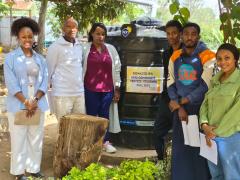Stakeholder Engagement Event
On behalf of the Mastercard Foundation eLearning Initiative co-implementing partners, USIU-Africa held its first Stakeholder Engagement event on Thursday, March 3, 2022. The event targeted all the 10 partner universities, implementing partners (Arizona State University and USIU-Africa) and the Mastercard Foundation. The meeting was done virtually via zoom which had an attendance of 95 people. The aim of the meeting was to foster team spirit among the partner universities.
There were a number of speakers that included among others;
- Prof. Phil Cotton, Director of Human Capital Development at Mastercard Foundation, talked about Why e-Learning is a priority area for the Mastercard Foundation in Africa.
- Representatives from USIU-Africa, Arizona State University (ASU) and Mastercard Foundation shared important milestones that had been achieved to so far. They included; program champions’ training, Baobab platform, Center of Excellence and Content Management System, Scaling webinars, Institutional Learning Resource Center consultation, Calls for research proposals.
- Prof. Freida A Brown, Interim Vice Chancellor of USIU-Africa, spoke of promoting champions’ cohesion at individual and Institutional levels. She also emphasized collaboration across Partner network institutions.
- Dr. Minu Ipe, Director and Vice Chair of University Design Institute (UDI) at Arizona State University, provided inspiration, frameworks and guidance on leading change at higher education institutions for e-Learning launch and sustainability.
After the talks there was a breakout room session where the attendees were engaged in discussion in 4 different groups and each group discussed one specific topic among these;
- Early individual wins
- Institutional Progress and Changes
- Challenges experienced
- Areas of focus for further progress and impact
From these breakout sessions, the plenary concluded that there was need for more focus on inclusive learning to cater for People with Disabilities (PWD). It was also evident that many universities had challenges administering STEM (science, technology, engineering and mathematics) courses. Lastly internet connectivity remained a challenge to many universities especially learners from remote areas.






